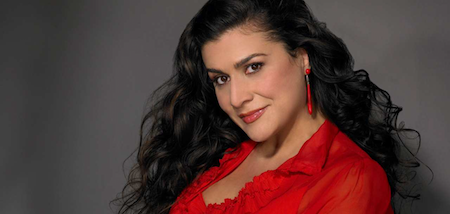Bartoli has intimated in interviews that this European tour of a semi-staged
La Cenerentola could be the last time she sings Cinderella, real name
Angelina, one of her signature roles. Her bravura performance attested that she
is still a vocally great Angelina. Physically she was completely credible as
the mistreated stepdaughter whose unbridled optimism is rewarded with a
spectacular change of fortune. Perhaps Bartoli should not hang up her glass
slippers yet, though Rossini’s heroine loses none. Instead, Angelina
gives the prince one of two matching bracelets, inviting him to find out who
she is. La Cenerentola was composed for the 1817 Roman carnival and
librettist Jacopo Ferretti made sure the papal censor would not be offended by
women baring their feet. Neither is there a fairy godmother. The entirely
nonmagical task of bringing Angelina and Prince Ramiro together is entrusted to
the prince’s tutor, Alidoro. Instead of a cruel stepmother there is a
self-regarding stepfather, the impoverished aristocrat Don Magnifico. Angelina
falls in love with the prince while he is disguised as his valet, Dandini,
which twists the plot and underlines her goodness — she refuses
Dandini’s marriage proposal when he makes it disguised as the prince.
Happily, Rossini and Ferretti kept the viperish stepsisters. Sen Guo’s
Clorinda needled with her incisive soprano and Irène Friedli lent the
ungainly Tisbe her hooty mezzo. They shuffled to the ball as Fish and Fowl,
hideously got up as a squamous mermaid and a fuzzy peacock. The costumes, from
a 1992 production for Zurich by Cesare Lievi, were all over the place in terms
of fashion eras. Claudia Blersh directed the singers around a squat sofa with
minimal intervention. She scored a couple of comedic goals, but baritones
Alessandro Corbelli and Carlos Chausson as Dandini and Don Magnifico provided
the real humour. Corbelli’s voice is now dry and just a husk of its
former self. His comedic inflection and phrasing, however, are impeccable. His
Dandini was stylistically exemplary and hugely entertaining. Chausson, rich and
sonorous, savoured every word of Don Magnifico’s splenetic recitatives
and raced through his rat-a-tat patter with facility. In the hands of two such
ace Rossini comedians, the duet “Un segreto d’importanza”, in
which Dandini reveals his true identity to Magnifico, was a standout number.
The chorus of the Monte-Carlo opera gave the third outstanding male
performance, displaying great dynamic finesse and tonal shine.
Sounding constricted at first, bass Ugo Guagliardo as Alidoro took some time
to find his vocal footing before revealing an attractive bass with limpid
legato. Edgardo Rocha has an exquisite light lyric tenor and a flair for the
Rossini idiom. It is a shame that his Prince Ramiro seemed restrained
throughout most of the evening, both in volume and animation. Maybe he needed
more theatrical direction than was available. He certainly can light up the
stage, as he did during his showpiece aria "Sì, ritrovarla io giuro",
singing ardently and hitting one silvery high C after another. Conductor
Gianluca Capuano kept up a constant rhythmic momentum, building up the
ensembles like a master patissier stacking a multitiered cake. Les Musiciens du
Prince, of which Bartoli is artistic director, played with loads of pep,
whipping up a robust storm in the Temporale, under flashing house
lights. Even allowing for the wildness of period brass, there were several
skidded entrances, but the beautiful woodwinds were a great asset and the
orchestra as a whole kept the music fizzing.
Then there was Bartoli herself, whose task as the primadonna was to outshine
all others, just like Cinderella at the ball. This she did. Bartoli’s
voice has lost a little of the gleam of her younger years, but none of its
distinctive colours or its stupefying agility. Her lower notes have deepened
and her top A’s and B’s are as pinging as ever. Cinderella’s
first words at the royal palace, a series of intricate runs spanning two
octaves, were executed with breathtaking fluency. The glittering technique and
infectious elation of the final rondo, “Nacqui all’affanno e al
pianto” worked the audience up to a joyous roar. People cheered Bartoli
in her ivory wedding dress as they would a real bride. The way she throws off
her head-spinning runs is mightily impressive, but Bartoli also puts her heart
and soul into every word. Her Angelina, far from being a dull goody two shoes,
is disarmingly determined. In the end, one cheers her on not because she is a
paragon of integrity, but because she is a real, suffering, hoping, rejoicing
human being.
Jenny Camilleri
Cast and production information:
Angelina: Cecilia Bartoli, mezzo-soprano; Prince Ramiro: Edgardo Rocha,
tenor; Dandini: Alessandro Corbelli, baritone; Don Magnifico: Carlos Chausson,
baritone; Alidoro: Ugo Guagliardo, bass; Clorinda: Sen Guo, soprano; Tisbe:
Irène Friedli, mezzo-soprano; Mise en scène: Claudia Blersh.
Costume Design: Luigi Perego. Chœur de l’Opéra de
Monte-Carlo, Les Musiciens du Prince. Conductor: Gianluca Capuano. Heard at the
Concertgebouw, Amsterdam, Wednesday, 15th February, 2017.
